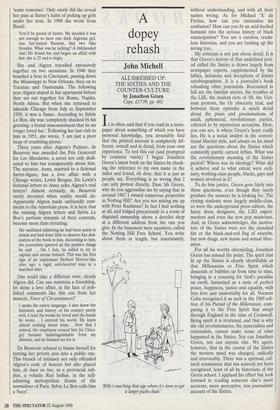A dopey rehash
John Michell
ALL DRESSED UP: THE SIXTIES AND THE COUNTER-CULTURE by Jonathon Green Cape, f17.99, pp. 482 It is often said that if you read in a news- paper about something of which you have personal knowledge, you invariably find that the printed account is completely dif- ferent, overall and in detail, from your own experience. To test this out (and prompted by common vanity) I began Jonathon Green's latest book on the Sixties by check- ing the reference to my own name in the index and found, oh dear, that it is just as people say. Everything is so wrong that I can only protest directly. Dear Mr Green, why do you aggrandise me by saying that in around 1967 I owned numerous properties in Notting Hill? Are you not mixing me up with Peter Rachman? In fact I had nothing at all, and lodged precariously in a room of disputed ownership above a derelict shop at a different address from the one you give. In the basement were squatters, called the Notting Hill Free School. You write about them at length, but inaccurately, Billy's reaching that age where it's time to get a larger push-chair ' without understanding, and with all their names wrong. As for Michael 'X' de Freitas, how can you rationalise his confusion? How can you fit an acid-fuelled fantasist into the serious history of black emancipation? You are a careless, credu- lous historian, and you are barking up the wrong tree.
My criticism is not just about detail. It is that Green's history of that undefined peri- od called the Sixties is drawn largely from newspaper reports, supplemented by the fables, delusions and deceptions of Sixties autobiographers. It is a journalist's book rehashing other journalists. Recounted in full are the familiar stories, the troubles at the LSE, the student riots of '68, the Viet- nam protests, the Oz obscenity trial; and between these episodes is much detail about the plans and proclamations of small, ephemeral, revolutionary parties, referred to by mysterious acronyms. Here, you can see, is where Green's heart really lies. He is a social analyst in the conven- tional Marxist style, and always on his mind are the questions about the Sixties which constantly puzzle earnest lefties. What was the revolutionary meaning of the Sixties period? Where was its ideology? What did it achieve and to what extent were ordi- nary, working-class people, blacks, gays and women involved in it?
To do him justice, Green goes fairly into those questions, even though they rarely produce the answers he is looking for. The rioting students were largely middle-class, so were the underground press editors, the fancy dress designers, the LSD experi- menters and even the new pop musicians. And, as Green acknowledges, the motiva- tors of the Sixties were not the clenched fist or the black-and-red flag of anarchy, but new drugs, new music and sexual liber- ation.
For all his worthy chronicling, Jonathon Green has missed the point. The spirit that lit up the Sixties is clearly identifiable as that Millenarian or Free Spirit which descends or bubbles up from time to time, bringing in a yearning for God's paradise on earth, fantasised as a state of perfect peace, happiness, justice and equality, with free love and immortality for all. Norman Cohn recognised it as such in the 1969 edi- tion of his Pursuit of the Millennium, com- paring it to the Free Spirit that swept through England in the time of Cromwell. Being spirit it is irrational, and that is why the old revolutionaries, the materialists and rationalists, cannot make sense of what happened in the Sixties. Nor can Jonathon Green, nor can anyone else. We agree, however, that in the course of the Sixties the western mind was changed, radically and irrevocably. There was a spiritual, cul- tural renaissance that has scarcely yet been recognised, least of all by historians of the Green school. I applaud his effort but look forward to reading someone else's more accurate, more perceptive, less journalistic account of the Sixties.
























































 Previous page
Previous page